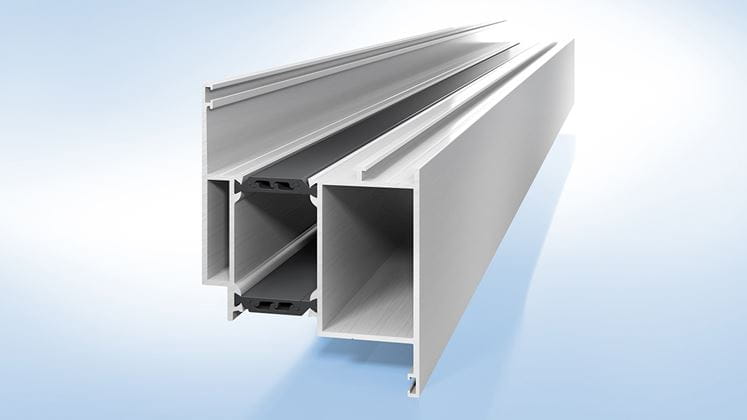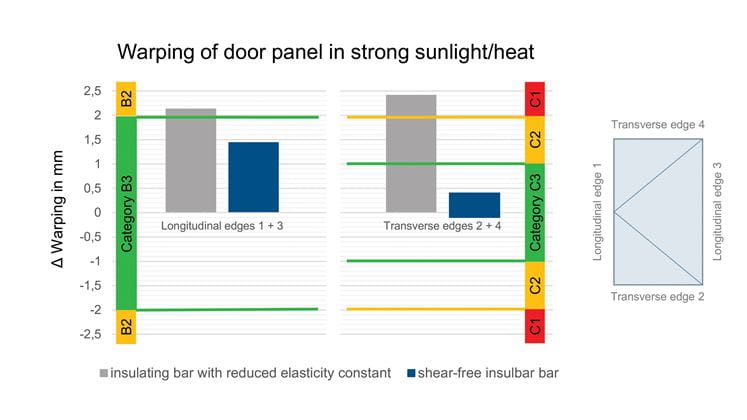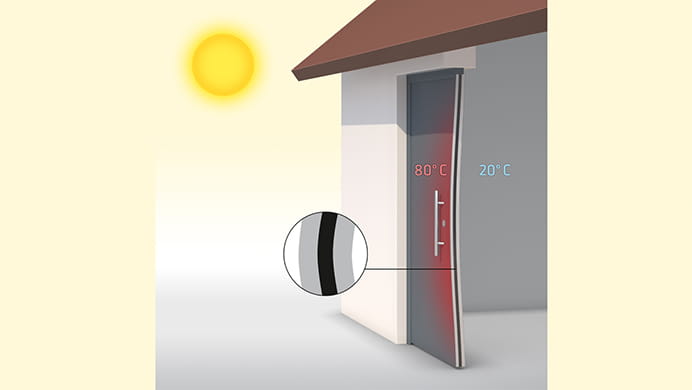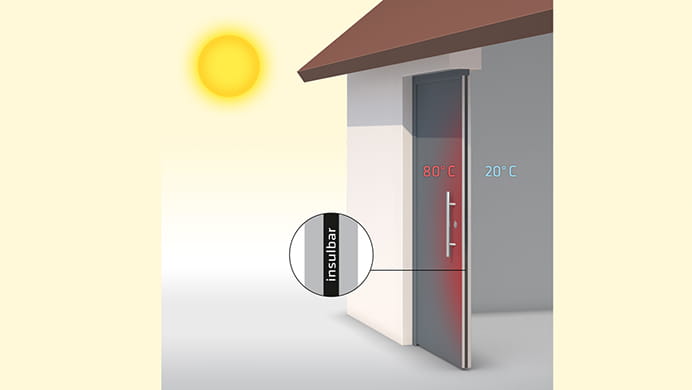03/17/2020 / Press release
insulbar puts door in best climate category
Ensinger’s shear-free insulating bar for metal doors scores well in the comparison test and enables the best climate category B3/C3
Thanks to their high resistance to weathering, aluminum doors are becoming more and more popular. If, however, the temperature on the outside vastly differs from that on the inside, for example in strong sunlight or in the case of frost, the door panel can become slightly deformed. The result: the door sticks or is difficult to open and close.
Minimizing the bi-metal effect
The promise of a remedy for the ‘bi-metal effect’ comes in the form of the shear-free insulbar insulating profile, which Ensinger has developed specially for the thermal separation of metal doors and for which it has filed a patent.
At the gbd Lab testing institute in Dornbirn, Austria, front doors with anti-bi-metal profiles have now been put to the test. The institute compared a metal door with the shear-free insulbar bar and a door with the insulating profile with reduced elasticity constant from another manufacturer. With both test objects, the warping of the door in a longitudinal (B for bending) and transverse direction (C for curvature) was tested in different climates (reference climate, frost, heat) in accordance with testing standard EN 1121 and classified in accordance with EN 12219.
Flexible insulation zone
“Unlike shear-resistant profiles and profiles with a reduced elasticity constant, the shear-free polyamide bar from Ensinger consists of two parts which shift against one another when there is differing thermal expansion of the inner and outer shells of the door”, explains Matthias Rink, Sales Director for insulbar at Ensinger. “This generates a flexible insulation zone which still has a high transverse tensile strength that minimizes the bi-temperature effect.”
The impact of the shear-free profile was confirmed during the test: With insulbar, the longitudinal warping of the 2.18 m x 1.23 m aluminum door was significantly less than 2 mm, and the transverse warping was less than 1 mm. Thus in all three climates tested, this door attains the best category B3/C3. The reference product only managed it into the category B2/C1 and was unable to fulfill the minimum requirement of the door manufacturer.
Summary: The warping of front doors that is the result of temperature-induced effects can be minimized effectively with the shear-free plastic insulating bar from Ensinger.
(2,461 characters including spaces)
 Fig. 1: The shear-free insulating profile from Ensinger connects the aluminum shells of doors and evens out the temperature-induced, differing linear expansion of the metal profiles.
Fig. 1: The shear-free insulating profile from Ensinger connects the aluminum shells of doors and evens out the temperature-induced, differing linear expansion of the metal profiles.
 Fig. 2: The testing institute gbd Lab tested the warping from different weather-related effects in two thermally separated front doors. One door had an insulating bar with a reduced elasticity constant, the other the shear-free insulating bar from Ensinger. The diagram shows that in a summery climate (temperature of door, inside: 25 ± 5 °C, outside: + 80 ± 5 °C), the door with the shear-free bar attains the best category B3/C3 and reduces the bi-metal effect effectively.
Fig. 2: The testing institute gbd Lab tested the warping from different weather-related effects in two thermally separated front doors. One door had an insulating bar with a reduced elasticity constant, the other the shear-free insulating bar from Ensinger. The diagram shows that in a summery climate (temperature of door, inside: 25 ± 5 °C, outside: + 80 ± 5 °C), the door with the shear-free bar attains the best category B3/C3 and reduces the bi-metal effect effectively.
 Fig. 3: On the left, a door with a conventional insulating profile: the large temperature difference causes the door to become warped.
Fig. 3: On the left, a door with a conventional insulating profile: the large temperature difference causes the door to become warped.
 Fig. 4: On the right, an aluminum assembly with a shear-free insulbar insulating profile: the flexible insulation zone evens out the differing linear expansion values of the inner and outer shells effectively and prevents deformation.
Fig. 4: On the right, an aluminum assembly with a shear-free insulbar insulating profile: the flexible insulation zone evens out the differing linear expansion values of the inner and outer shells effectively and prevents deformation.
About insulbar
About Ensinger
The Ensinger Group is engaged in the development, manufacture and sale of compounds, semi-finished materials, composites, technical parts and profiles made of engineering and high-performance plastics. To process the thermoplastic polymers, Ensinger uses a wide range of production techniques, such as extrusion, machining, injection moulding, casting, sintering and pressing. With a total of 2,600 employees at 35 locations, the family-owned enterprise is represented worldwide in all major industrial regions with manufacturing facilities or sales offices.
More information: www.ensingerplastics.com
Press contact
Karin Skrodzki
Ensinger GmbHPR und Kommunikation Bauprodukte
Rudolf-Diesel-Straße 8
D-71154 Nufringen
Tel. +49 7032 819 674
[obfemailstart]a2FyaW4uc2tyb2R6a2lAZW5zaW5nZXJwbGFzdGljcy5jb20=[obfemailend]